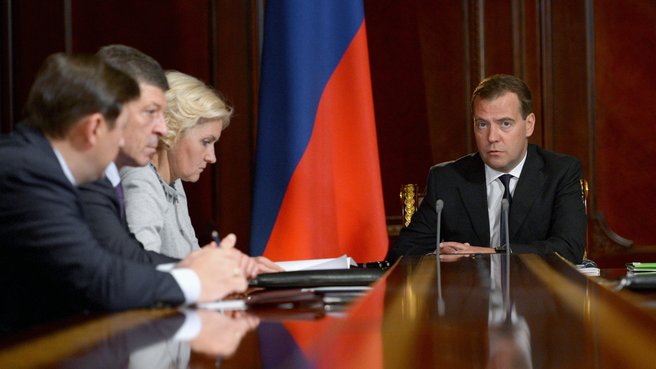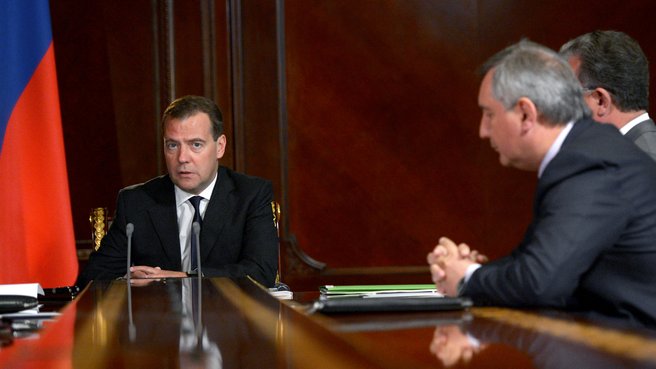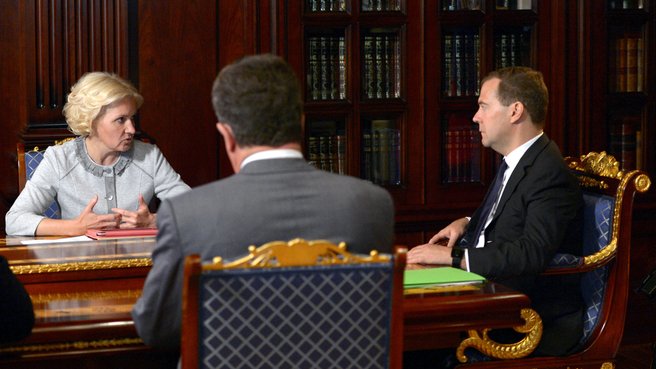Maternal mortality in Russia has more than halved since 2005.
Transcript of the beginning of the meeting:
With Deputy Prime Minister Olga Golodets, Deputy Prime Minister Dmitry Kozak and Deputy Prime Minister Alexander Khloponin
Dmitry Medvedev: Some statistical data makes us gloomy, while other statistics inspire optimism. I’d like to say a few words about the latter kind. According to recent statistics, maternal mortality has more than halved since 2005, the year we launched the national healthcare project. Some regions reported especially good results: the mortality rate in 23 Russian regions now corresponds to the level of Western European countries.
This is a really good achievement, which has been brought about by our efforts, in particular the construction of 23 perinatal medical centres in recent years and the Maternity Certificate programme which we have been implementing for the past seven years. It includes the supply of new equipment and medicines to (maternity) hospitals.
Dmitry Medvedev: "Maternal mortality has more than halved since 2005, the year we launched the national healthcare project."
Other important elements are the establishment of several mobile obstetrical teams and telemedical healthcare centres. Overall, there have been positive dynamics, which we must keep up. Ms Golodets (Olga Golodets), what will we do to ensure this?
Olga Golodets: Indeed, the improvements are even better than we planned. We registered positive change in the regions, especially where perinatal centres were established and doctors were trained in new medical skills. Furthermore, we registered a breakthrough in the reduction of the death rate, which was 11.5% last year compared to 16.2% in 2011. This is a major achievement for Russia.
We are now working differently in each region and even municipality, because the current programme for the development of perinatology and for helping mothers and children is based on geographical characteristics, in particular in the 32 regions where this kind of medical assistance has been insufficiently effective.
We propose developing this programme with regard to the 34 new perinatal centres. Their construction in the next four years should ultimately resolve the issue of childbirth problems. There is a good opportunity to keep up the current positive trend.
Dmitry Medvedev: "I have signed a Government resolution that sets forth the duration of the additional annual paid leaves for a specific category of workers. Additional vacation time and shorter working hours will be afforded to physicians and other professionals who deal with dangerous diseases, such as HIV and tuberculosis, to name a few."
Dmitry Medvedev: The only thing I wanted to say is that our regions have always been very diverse. There are 23 regions in Russia that boast performance indicators that are close to Western Europe. Good for them. Occasionally, they got lucky: some of them pushed to have a perinatal centre built on their territory by doing a lot of legwork, going from office to office, and ended up receiving the funds or other resources to get it done, while others have found themselves in a much more complicated situation. I believe we should focus on the poorly performing regions: we do have such regions. Mr Khloponin just started nodding his head, because some of these regions are located in the Caucasus.
Another healthcare problem is work-related. I have signed a Government resolution that sets forth the duration of the additional annual paid leaves for a specific category of workers. Additional vacation time and shorter working hours will be afforded to physicians and other professionals who deal with dangerous diseases, such as HIV and tuberculosis, to name a few.
This measure was first introduced in 1974. This issue had to be dealt with and it’s been resolved now. Importantly, the duration of these leaves will not be reduced (there were some concerns on this account).
Dmitry Rogozin: "On July 2, we will launch three new GLONASS satellites into orbit from Baikonur."
There’s one more issue to be discussed during the open part of our meeting – developing space activities. We are constantly monitoring this issue. There are problems, but there are results as well. In any case, we should prioritise our work. I’m referring to further developing the GLONASS system, the construction of the cosmodrome Vostochny, and the creation of the Angara rocket complex. Recently, Mr Rogozin was at this cosmodrome and dealt with these issues. They were launching a missile when he was there. Please update us on the current state of affairs there.
Dmitry Rogozin: Mr Medvedev, I’ll start with GLONASS. We are now updating the satellite group as scheduled: 24 satellites are being used as originally designed and four more satellites are on standby. A new GLONASS-K satellite is being tested. Later, we will upgrade the entire group. In general, the system allows us to stay on duty globally at all times. Of course, this is an unparalleled system. Our key goal now is to secure demand for the GLONASS group, including from our international partners, such as India, who are interested in joining the GLONASS programme.
We are currently replacing satellites as scheduled. On July 2, we will launch three new GLONASS satellites into orbit from Baikonur. Several days ago, we shipped the last of these three satellites to Baikonur, so things are on schedule.
As for Vostochny cosmodrome, I was there recently. The work is on schedule, even though the amount of work is truly unprecedented: they are building two launch pads, a whole town, in a way. The Amur Region residents are discussing the possibility of renaming this town after Tsiolkovsky.
By July 1, we will put together all the required technical documentation for the first phase of construction of housing for 12,000 young professionals who have moved there permanently. We face one major problem, Mr Medvedev, which is labour shortages. We now have 6,500 people working at the construction site. By late 2013, we should have 10,000 construction workers, of whom – I want to emphasise this – only 980 people are locals. So we will have to send in workers and specialists from Siberia and probably from European Russia.
Dmitry Medvedev: For obvious reasons, large construction projects in Russia – from imperial times to Soviet times – traditionally have involved specialists from all over the country.
Dmitry Rogozin: We haven’t had such large-scale construction projects in recent years.
Dmitry Medvedev: It’s good that we have one now. This will promote the region’s development.
Dmitry Rogozin: The Spetsstroy construction company informed us that they have ways to hire specialists and get the necessary equipment. So we are hopeful that we will keep up with the schedule and be able to perform launches starting in 2015, as planned. In late 2015, we will have the first flight of Soyuz, and by 2018 we will be able to launch the heavy-duty manned Angara spacecraft. So far, according to the information submitted to the Government, everything is on schedule.
With regard to Angara, I’ve already reported to you that the train carrying the light-duty Angara went to Plesetsk on the night of May 27-28. It arrived on May 31 and the equipment is now being installed. Work on the heavy-duty Angara is likewise on schedule at the Khrunichev missile plant, and we will send it to Plesetsk later this year.
There are some problems with land-based infrastructure. However, the pace of the work and the information coming from the Federal Space Agency and Spetsstroy make us confident that they will make up for the lag in the next month and a half months. The schedule was approved by all contractors. The Government Military-Industrial Commission monitor the situation.
Mr Medvedev, I would like to ask you to set aside some time in your schedule and visit Plesetsk to hold a big organisational meeting.
Dmitry Medvedev: All right. It's important to hold such a meeting to make sure that things are done well and in time. Please report back to me later.
Dmitry Rogozin: I will.
Dmitry Medvedev: Thank you.














